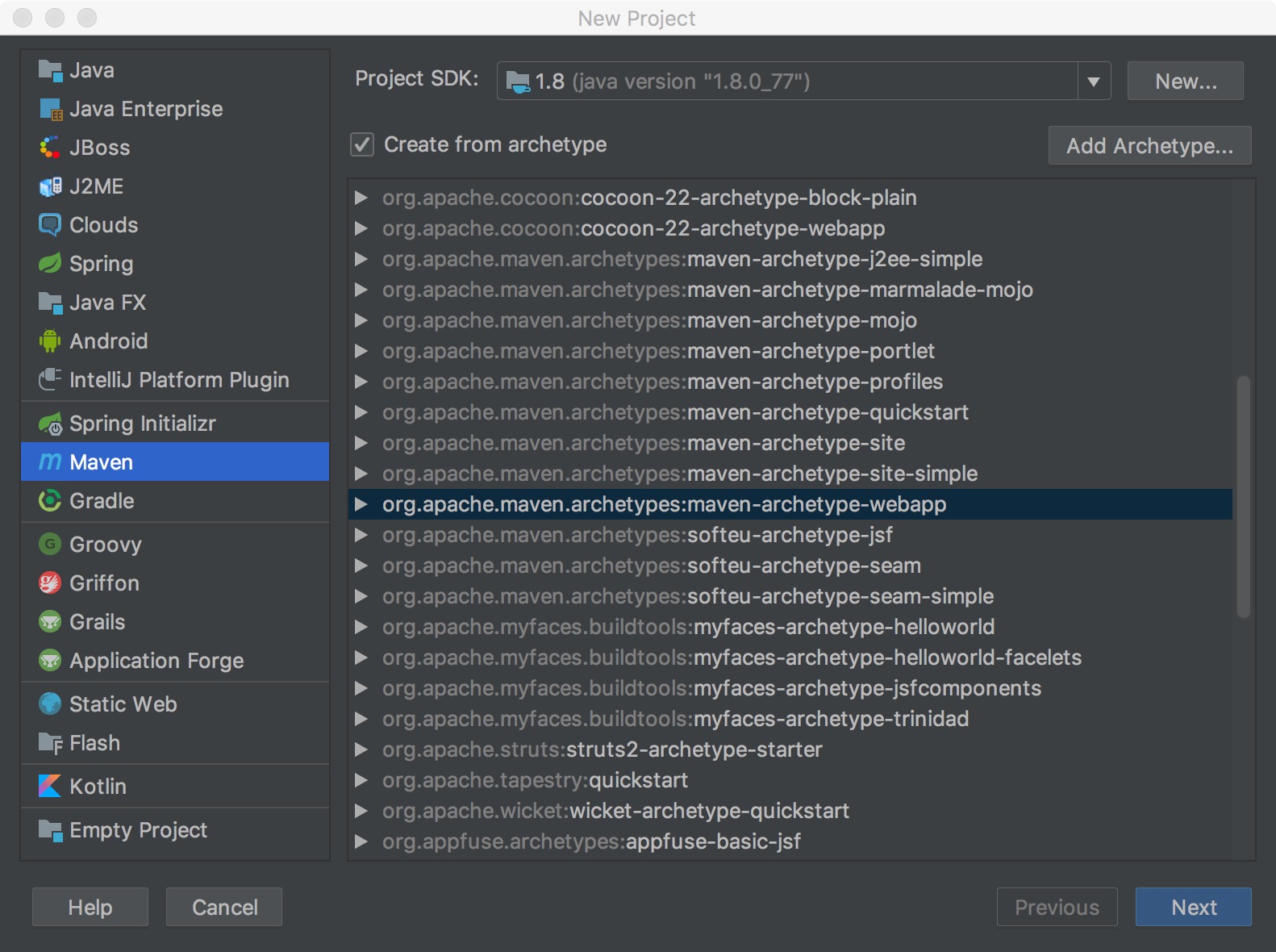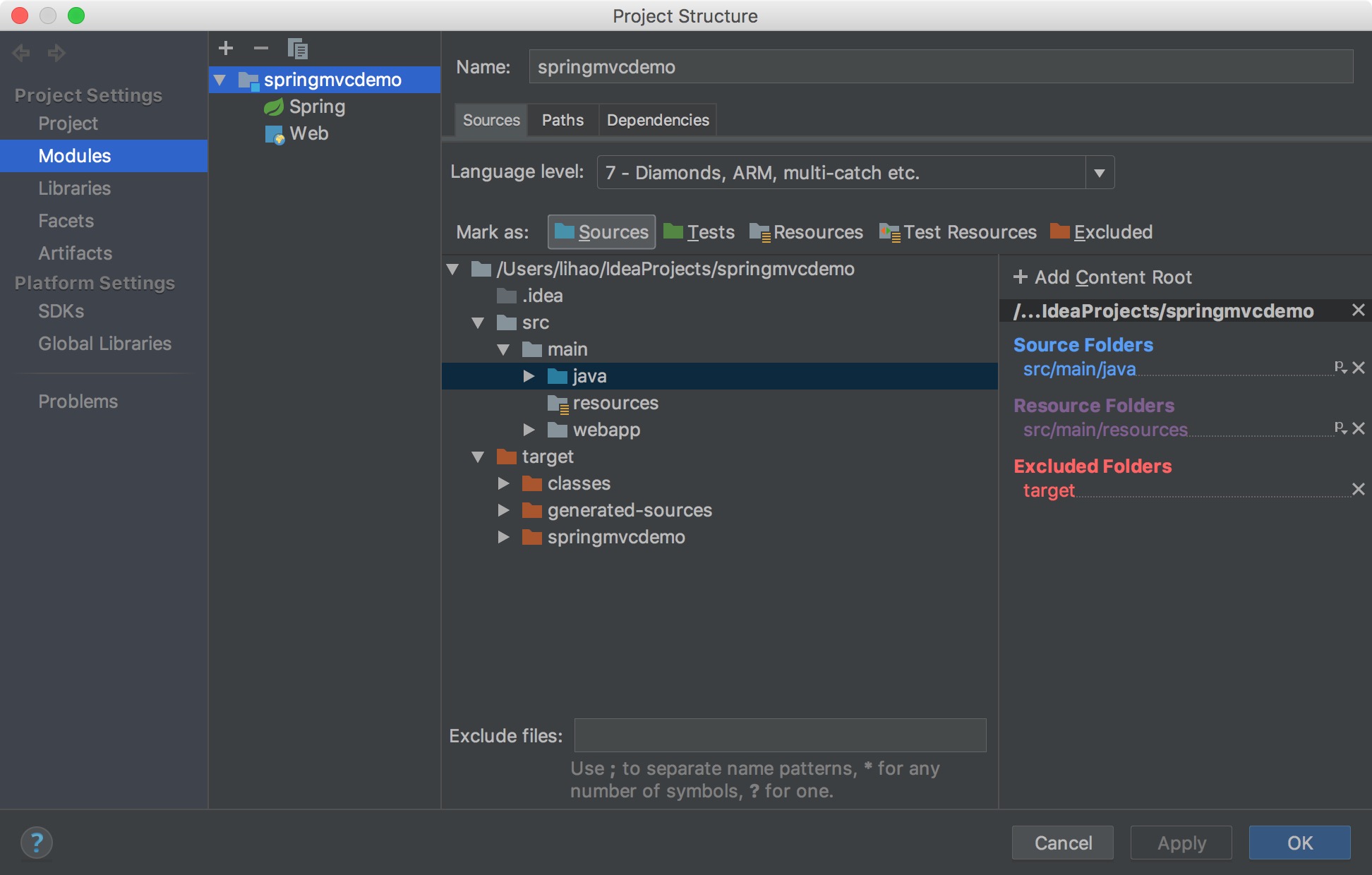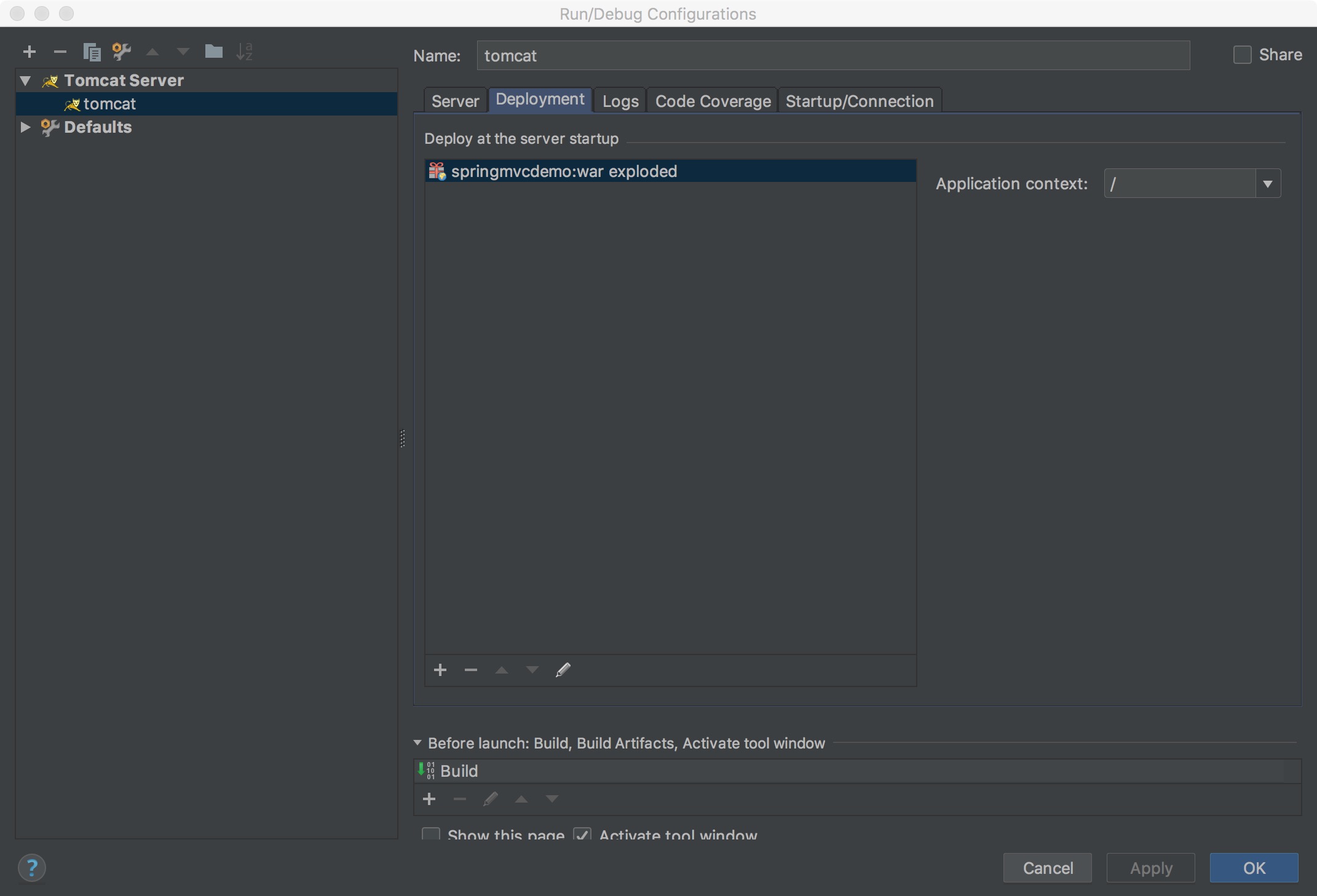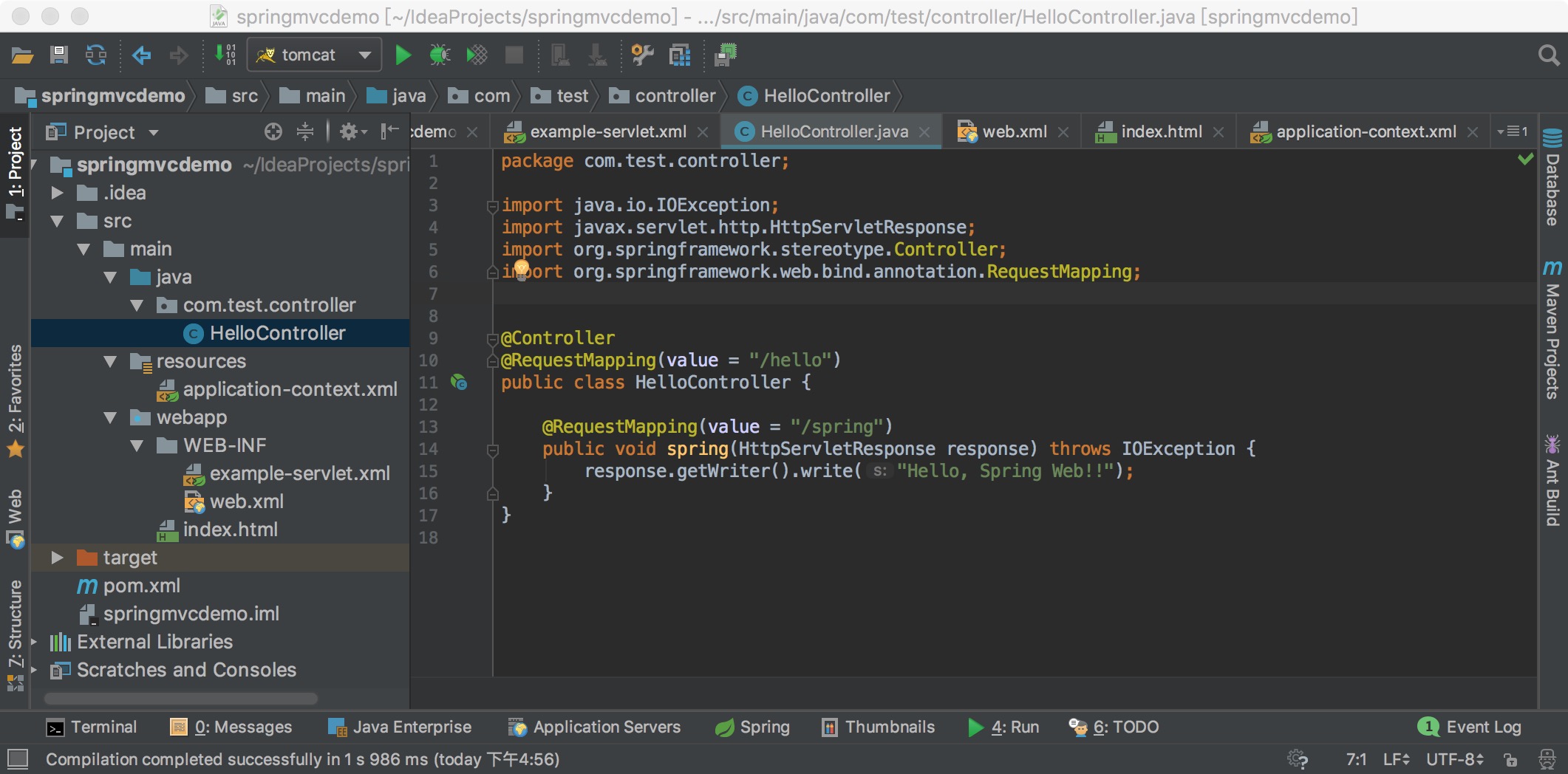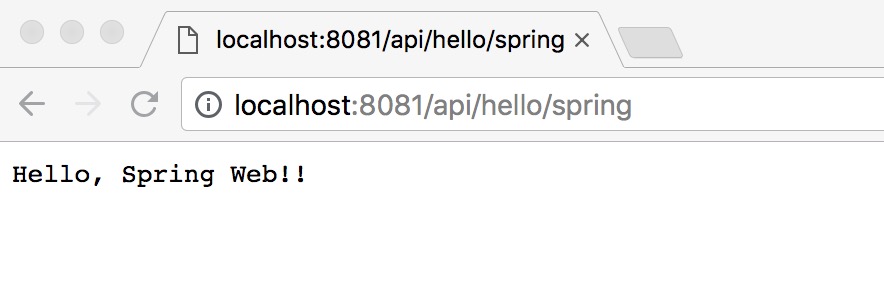Spring Web MVC 是一个建立在 Servlet API 的 Web 框架,它属于 Spring Framework 的产品。Spring Web MVC 名称来源于模块 spring-webmvc ,但它更常用的叫法是 Spring MVC。
使用 IntelliJ IDEA 创建一个 Maven 项目,选择 webapp 类型。
创建好 Maven 项目后,我们在 pom.xml 文件中添加依赖。
1 2 3 4 5 6 7 8 9 10 11 12 13 <dependencies > <dependency > <groupId > org.springframework</groupId > <artifactId > spring-webmvc</artifactId > <version > 5.0.7.RELEASE</version > </dependency > <dependency > <groupId > javax.servlet</groupId > <artifactId > javax.servlet-api</artifactId > <version > 3.0.1</version > <scope > provided</scope > </dependency > </dependencies >
为编写代码,我们在 main 目录下创建 java 目录,并标记为 Source 目录。接下来在 main 目录下添加 resources 目录,并标记为 Resource 目录。如下图所示:
为运行 Spring MVC 项目,我们还需要配置 tomcat 服务器。 先在官网下载 tomcat,然后在 IntelliJ IDEA 添加 tomcat ,如下图所示:
配置完 tomcat 服务器后,还需要将项目部署到 tomcat 中运行。在 Deployment 选项窗口中将本项目配置进去。
Tomcat 服务器配置完毕,可以点击运行按钮进行测试。如果可以正常打开浏览器,并显示 Hello World 的字样,说明配置成功。
经过以上的配置,Spring MVC 项目的框架就搭建完毕了,接下来就可以编写代码了。
配置 web.xml 我们将 web.xml 配置修改为:
1 2 3 4 5 6 7 8 9 10 11 12 13 14 15 16 17 18 19 20 21 22 23 24 25 26 27 28 <?xml version="1.0" encoding="UTF-8" ?> <web-app xmlns:xsi ="http://www.w3.org/2001/XMLSchema-instance" xmlns ="http://java.sun.com/xml/ns/javaee" xsi:schemaLocation ="http://java.sun.com/xml/ns/javaee http://java.sun.com/xml/ns/javaee/web-app_2_5.xsd" version ="2.5" > <display-name > spring-web</display-name > <welcome-file-list > <welcome-file > index.html</welcome-file > </welcome-file-list > <context-param > <param-name > contextConfigLocation</param-name > <param-value > classpath:application-context.xml </param-value > </context-param > <listener > <listener-class > org.springframework.web.context.ContextLoaderListener</listener-class > </listener > <servlet > <servlet-name > example</servlet-name > <servlet-class > org.springframework.web.servlet.DispatcherServlet</servlet-class > </servlet > <servlet-mapping > <servlet-name > example</servlet-name > <url-pattern > /api/*</url-pattern > </servlet-mapping > </web-app >
在 web.xml 文件,我们添加了一个名为example的 servlet,用于处理 /api/ 的请求;并指定application-context.xml作为 spring 的上下文配置文件。
配置 xxx-servlet.xml 配置完 web.xml 后,我们添加 servlet 的 xml 配置。上面我们配置了名为example的 servlet,故我们创建一个example-servlet.xml的文件,其内容如下:
1 2 3 4 5 6 7 8 9 10 11 12 13 <beans xmlns ="http://www.springframework.org/schema/beans" xmlns:context ="http://www.springframework.org/schema/context" xmlns:mvc ="http://www.springframework.org/schema/mvc" xmlns:xsi ="http://www.w3.org/2001/XMLSchema-instance" xsi:schemaLocation =" http://www.springframework.org/schema/beans http://www.springframework.org/schema/beans/spring-beans.xsd http://www.springframework.org/schema/context http://www.springframework.org/schema/context/spring-context.xsd http://www.springframework.org/schema/mvc http://www.springframework.org/schema/mvc/spring-mvc.xsd" > <context:component-scan base-package ="com.test.controller" /> </beans >
example-servlet.xml文件里面指定了 controller 的包为com.test.controller。
添加 controller 上述 servlet 配置文件中指定了 servlet 的包为com.test.controller,因此,我们在 java 目录下创建com.test.controller包,并添加类HelloController。
1 2 3 4 5 6 7 8 9 10 11 12 13 14 15 16 package com.test.controller;import java.io.IOException;import javax.servlet.http.HttpServletResponse;import org.springframework.stereotype.Controller;import org.springframework.web.bind.annotation.RequestMapping;@Controller @RequestMapping(value = "/hello") public class HelloController { @RequestMapping(value = "/spring") public void spring (HttpServletResponse response) throws IOException { response.getWriter().write("Hello, Spring Web!!" ); } }
注解 @Controller的含义是指类HelloController为一个处理请求的 Controller。@RequestMapping用于定义请求 url 的映射,上述代码表明我们将 /hello/spring 的请求映射到方法spring()中处理。
完成以上步骤后,我们就完成了一个完整 spring mvc 的示例。项目源代码和配置如下图所示:
运行 运行项目,在浏览器中输入http://localhost:8081/,显示结果如下:
在浏览器中输入http://localhost:8081/api/hello/spring,显示结果如下:
这表明 Spring MVC 框架将 /api/hello/spring 的请求由类HelloController中的spring()方法进行了处理。
参考资料
https://docs.spring.io/spring/docs/current/spring-framework-reference/web.html#mvc-introduction https://my.oschina.net/gaussik/blog/385697 https://my.oschina.net/gaussik/blog/513353 https://blog.csdn.net/Mr_Sk/article/details/68947018
